This article was co-authored by Trudi Griffin, LPC, MS. Trudi Griffin is a Licensed Professional Counselor in Wisconsin specializing in Addictions and Mental Health. She provides therapy to people who struggle with addictions, mental health, and trauma in community health settings and private practice. She received her MS in Clinical Mental Health Counseling from Marquette University in 2011.
There are 14 references cited in this article, which can be found at the bottom of the page.
wikiHow marks an article as reader-approved once it receives enough positive feedback. In this case, 83% of readers who voted found the article helpful, earning it our reader-approved status.
This article has been viewed 51,221 times.
Sexual abuse is a horrible thing to go through, but there are ways to get help for yourself. Call 911 if you are in immediate danger, talk to someone who cares about you, or call a help hotline. If you are a survivor of abuse, you may have a lot of emotional pain to work through. Recovering from sexual abuse can be frustrating and take a long time, so you may want to seek help from counseling and support groups to help you through this process.
Steps
Spotting Sexual Abuse
-
1Know what behavior counts as sexual abuse. Sexual abuse means sexual behavior (touching or not touching) without the other person's consent. It can happen often or only once. Here are some examples of things that are abuse if they aren't done with consent:[1] [2] [3]
- Inappropriately sexual conversations or comments about your body
- Showing you sexual imagery (such as porn or naked photos)
- Taking or sharing explicit photos of you
- Spying or repeatedly bursting into the room when you are changing or showering
- Touching you sexually, making you touch them sexually, or making you touch someone else sexually while they watch
- Pressuring you to do sexual activities with them (e.g. guilting you or using threats)
- Taking sexual advantage of you while you are drunk or drugged
- Denying you contraception and protection from sexually transmitted diseases
Did You Know?Any sexual behavior between an adult and a child is sexual abuse.[4] Children may blame themselves for their appearance or behavior. But it is an adult's responsibility not to harm children. For example, if a young teen flirts with a teacher, a decent teacher will not reciprocate.
-
1Know how consent works. Consent means willingly saying "yes" with either words or clear body language. For true consent, the person must be clear-headed and mature enough to understand the sexual nature of the activity. If there is no consent, then sexual activity is wrong.
- Consent must be given freely. If someone gives in to pressure, threats, or coercion, then that is not real consent.
- Dating and marriage don't equal constant consent to sexual activity. It counts as sexual abuse if your partner/spouse is doing things to you without your consent.[5]
- Children can't consent because they are too young to understand. People with major intellectual disabilities also may be unable to consent.
-
2Identify signs of abuse in adults. Adults who have were sexually abused as children may also show signs of lingering trauma that can affect one’s physical and psychological well-being. Some common indicators of someone who was abused as a child include:[6]
- responding with fear to reminders of the assault
- feeling anxious and unsafe
- having flashbacks of the assault
- having problems with concentration
- ongoing feelings of guilt, anger, and/or depression
- having a poor self-image
- having problems with relationships
- losing interest in sex
-
3Watch for signs of sexual abuse in teens. Teenagers have similarities in how they may respond to sexual abuse as well. Some common signs to look for in teens include:[7]
- injuring self (cutting, burning)
- having poor personal hygiene
- abusing drugs and/or alcohol
- behaving in a sexually promiscuous manner
- running away from home
- showing signs of depression or anxiety
- making suicide attempts
- seeming to have a fear of intimacy or closeness
- changes in appetite, such as dieting or compulsive eating
-
4Learn how to recognize the signs of sexual abuse in children. While children may respond to sexual abuse in slightly different ways, there are some common indicators that may help you to identify sexual abuse in children. Some of the signs to watch for include:[8]
- changes in sleeping pattern or sleep disturbances, such as nightmares
- drastic changes is eating patterns or appetite
- sudden mood swings
- drops hints about abuse through playing, writing, drawing, or speaking
- develops a fear of a certain person or place
- talks about a new older friend and/or refuses to share secrets that he/she has with this person
- receives money, gifts, or toys from someone for no reason
- being repulsed by themselves or their body
- seems to have adult knowledge of sexual behaviors
Getting Help
-
1Call emergency services if you are in immediate danger. If you are in immediate danger of being abused, get yourself as far away from the person as you can and call 911 right away to get help. Try to get out of the house and go somewhere public if you can. If not, barricade yourself in a room until help arrives.
-
2
-
3Talk to someone who cares about you. Go to someone you trust, like a teacher, counselor, or loved one and explain the situation to them. Sexual predators count on you remaining silent and keeping their secrets, but you can stop the cycle by talking to someone about what’s been happening to you. Tell someone as soon as possible. Here are some examples of things you can say:
- "I need to talk about something difficult. Uncle Jacob has been sending me these upsetting texts about sex. I feel so dirty and uncomfortable any time he messages me. He keeps asking me to go somewhere alone with him and I'm scared. Can I show you the messages?"
- "My coach has been making all these inappropriate comments about my body. The first time she emailed me an adult video, I thought it was a mistake and I ignored it. But she sent me two more and said they made her think of me."
- "My boyfriend gets mad at me if I say no to sex and I'm scared."
-
4Call or text a hotline for help. If you are reluctant to talk to someone you know, call a sexual abuse hotline for help. They may be able to refer you to local resources in your community--such as domestic violence centers--where you can receive individual support.[11] Some hotlines you can call include:
- Safe Path: 608-392-7804 or 800-362-5454 ext.7804. Safe Path services are free and confidential.
- National Sexual Assault Hotline operated by RAINN: To be connected to the rape crisis center nearest to you, dial 1-800-656-HOPE (4673).[12]
- National Sexual Violence Resource Center (NSVRC) 1-877-739-3895.[13]
Dealing with Emotional Pain
-
1Consider seeking counseling. Even if you are no longer being abused or assaulted, it is possible for you to still be experiencing lingering physiological effects of trauma from the abuse.[14] You may have PTSD or PTSD-like symptoms. Flashbacks from the experience, along with intense fear and panic, can arise unexpectedly during your day-to-day life.[15] Often the scars remain years after the abuse has stopped, and many people go to counselors to seek further help in overcoming the effects of their past.
- A mental health counselor or therapist can lend you a supportive ear and provide various techniques to help you overcome the effects of any trauma that you might be holding on to.
- Domestic violence organizations often have counseling services to help victims of domestic violence situations and sexual assault.
-
2Realize it is not your fault. One of the most important steps to recognizing and escaping the clutches of sexual abuse is to realize that it is not your fault that you are or were being abused. Guilt or shame will sometimes arise, either as a result of the perpetrator's actions or from the way you are treated by people you tell, but it’s important not to allow this to keep you from telling other people and getting help for yourself.[16] It’s important to know that being assaulted or abused by another person is never your fault.
- Abusers choose to abuse other people. No matter how vulnerable or foolish you might have been, they chose to take advantage of you. They could have chosen to keep you safe, but they didn't.
- Abusers can play mind games. They might convince you of things that are wrong, and make you believe that you are undeserving of love and care.
-
3Show yourself some compassion. After an assault or ongoing abuse, it may take a while before you are feeling like yourself again. During this time you may feel frustrated, but it is important that you do not take out your frustration on yourself. Accept that you will need time to recover and that it will be a challenging process.[17]
- Imagine if a friend was going through the same thing. Think of the time it would take them to recover, and what you would say to them. Try to extend this empathy to yourself.
-
4Give yourself time to cry and be upset. Something horrible happened to you, so of course you are going to have difficult feelings about it. Let yourself be upset. Allow yourself to experience anger, sadness, confusion, and all kinds of emotions. This is a normal part of the healing process.
-
5Write about your thoughts and feelings. One way that you can begin to express your frustrations about what happened to you is to write about them. Start keeping a journal where you write a little bit each day. Write about whatever is on your mind. Some people even benefit from describing the abuse they endured.[18]
-
6Reach out to others who have also been abused. As you heal, you will need to keep talking to people who care and understand. Try joining a support group for survivors of sexual abuse to connect with people who understand what you are going through. These support groups can provide a safe place to talk about your experience and hear what other people have been through, which may help you realize that you are not alone.[19]
Building a Better Life
-
1Take good care of your body. It can be difficult to treat your body well after someone else treated it in ways that disgusted you (or talked about doing so). But you are worth taking good care of, even if it's hard to feel that way right now.
- Try to get enough sleep. Keep a reasonable bedtime. If you are having trouble sleeping, talk to a doctor.
- Try to eat 3 meals per day, plus snacks as needed. Aim for mostly healthy food and try to fill at least 1/3 of your plate with fruits and vegetables. Put healthy snacks on the shopping list.
- Get daily exercise, even if it's as small as a walk around the block. Moving your body keeps it healthy.
-
2Spend time with people you love. Look for the people who are most important in your life, the ones who lift your spirits and make you feel relaxed. Pick up the phone or go to the kitchen and spend time with them. The support of others will help you heal.
-
3Build your support network. Building a strong support system around yourself has been shown to be one of the most helpful things for you to do in order to deal with the sexual abuse and its effects. [20] Some tips for building and strengthening your support system are[21] :
- Accept invitations to events, even if it feels awkward and difficult at first.
- Don't wait to be invited somewhere. Take the initiative and call someone.
- Take part in campus and community organizations, residence hall or campus events, or family get-togethers.
- Strike up a conversation with the person next to you in class or at a local gathering. You could be introducing yourself to a new friend.
- Talk about things that interest other people. Be an alert listener.
-
4Make decisions to regain control. It is common to experience feelings that you are not in control or to have difficulty making decisions. The best thing that you can do to regain some control over your life is to start making decisions about your recovery and your future. Gather as much information as you can about your situation and make decisions about how you want to respond.
- If you are pressing charges for rape or domestic abuse, choose a lawyer to help you navigate the legal matters.
- If you have an STI or injuries, choose a doctor that can help you find treatment.
- For emotional recovery, choose a counselor to help you work through it.
- Consider exercise or self-defense training to help you regain confidence and feel more secure.
Warnings
- Never confront your abuser directly! They might become even more dangerous and harm you.⧼thumbs_response⧽
References
- ↑ https://www.atsa.com/what-sexual-abuse
- ↑ https://centerforfamilyjustice.org/faq/sexual-violence/
- ↑ https://www.rainn.org/get-help
- ↑ https://www.stopitnow.org/ohc-content/defining-child-sexual-abuse
- ↑ http://www.womenshealth.gov/violence-against-women/am-i-being-abused/index.html
- ↑ http://www.nsopw.gov/en-US/Education/RecognizingSexualAbuse?AspxAutoDetectCookieSupport=1
- ↑ http://www.nsopw.gov/en-US/Education/RecognizingSexualAbuse?AspxAutoDetectCookieSupport=1
- ↑ http://www.nsopw.gov/en-US/Education/RecognizingSexualAbuse?AspxAutoDetectCookieSupport=1
- ↑ https://www.thehotline.org/plan-for-safety/create-a-safety-plan/
- ↑ http://www.ncdsv.org/images/dv_safety_plan.pdf
- ↑ https://www.domesticshelters.org/
- ↑ http://www.justice.gov/ovw/sexual-assault
- ↑ http://www.justice.gov/ovw/sexual-assault
- ↑ http://doi.org/10.1177/0886260504268604
- ↑ http://doi.org/10.1177/0886260504268604
- ↑ https://journals.sagepub.com/doi/10.1111/j.1471-6402.2005.00171.x
- ↑ http://sapac.umich.edu/article/161
- ↑ http://sapac.umich.edu/article/161
- ↑ http://sapac.umich.edu/article/161
- ↑ http://doi.org/10.1177/0886260504268604
- ↑ https://www.k-state.edu/paccats/Contents/Stress/Develop%20support%20system.pdf





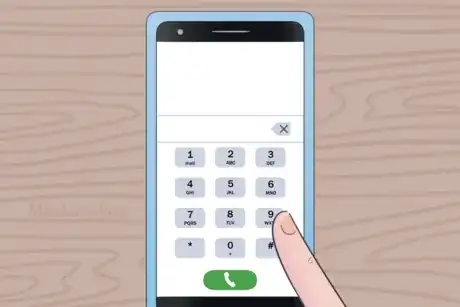

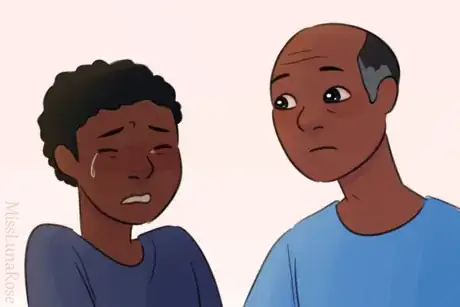
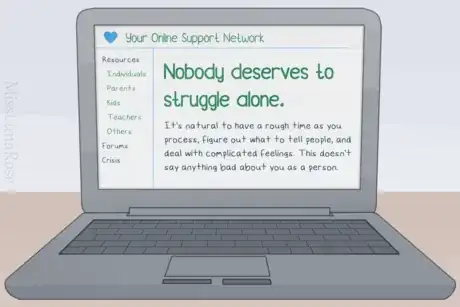





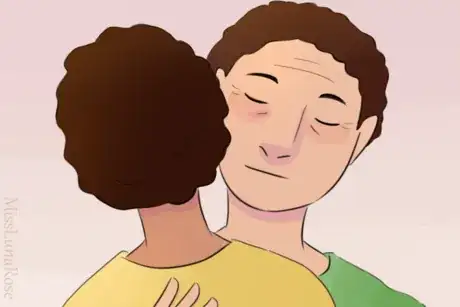




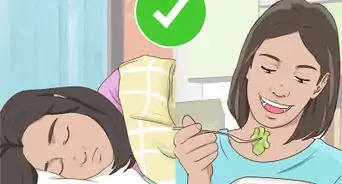

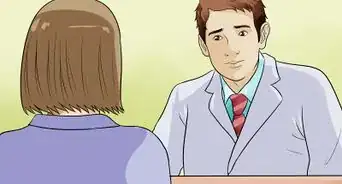
-Step-23-Version-2.webp)
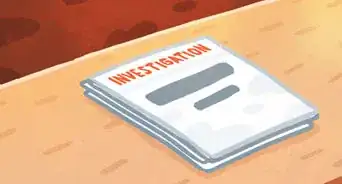








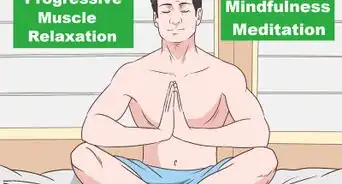













-Step-23-Version-2.webp)


































